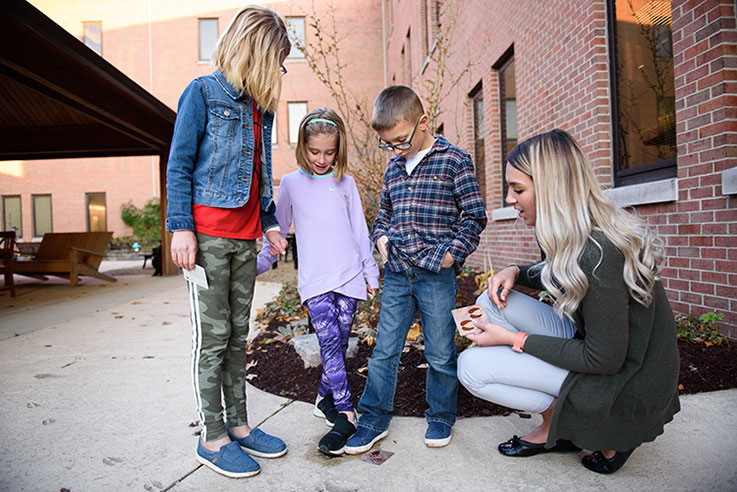Indiana University of Pennsylvania has received $100,000 from the Pennsylvania Department of Education to provide resources for kindergarten through grade 12 teachers in Indiana County area schools to assist with Science, Technology, Engineering, and Mathematics (STEM) education.
The funding will be used to develop and produce STEM-focused learning kits for participating teachers from area schools. The kits will be created and produced by IUP faculty members working with local educators, will include an age-appropriate curriculum and the resources needed to conduct the lessons.
 While the curriculum within each kit will focus on STEM-related fields, the goal is to provide opportunities for students to build problem-solving and decision-thinking life skills.
While the curriculum within each kit will focus on STEM-related fields, the goal is to provide opportunities for students to build problem-solving and decision-thinking life skills.
Holly Travis, IUP professor of biology and biology coordinator in the John and Char Kopchick College of Natural Sciences and Mathematics, is coordinating the project, which currently includes a group of IUP faculty volunteers from the departments of Biology, Education, Mathematics, Regional Planning, and IUP’s STEAMSHOP.
“This is a win for everyone involved—for IUP, for teachers, and especially for students in the school district,” Steve Hovan, interim dean of the Kopchick College, said. Hovan recognized the work of Senator Joe Pittman in IUP being chosen for the funds for this initiative. “Senator Pittman continues to be a great advocate for IUP, and we sincerely appreciate his support of this grant request,” Hovan said.
“In addition to her work with IUP students, Dr. Travis does an extraordinary job with outreach to K-12 educators, so she is a great fit to lead this project,” he said. “While this team has just begun its work, it’s exciting to see the collaboration between departments that is already underway.”
The STEM kits will be designed for specific grade levels and will include a curriculum overview, teacher resources, and the equipment needed for the experiments in the curriculum.
“This initiative has the potential to impact more than 1,000 students across several grade levels,” Travis said. “The IUP team is already excited about the work and the opportunity for collaboration with one another and with the K-12 teachers.”
After the initial meeting and discussion by the IUP team about the project, the next step is to invite interested K-12 teachers into the collaboration.
“We want to have a common theme throughout the different grade levels within the kits so that students can build on what they learn in previous grades,” Travis said. “We want to make sure that these kits offer something that teachers don’t currently have in their classrooms, so teacher input will be very important to this work,” she said. The kits could provide tools like drones or 3-D printers, for example.
Travis said that the kit topics could be as diverse as alternative energy, clean water, or water purification, but that the topics will relate to issues in the Indiana County region. While the themes may vary according to grade level and the overall curriculum for the class, the focus will be on developing a curriculum for the kits that include open-ended questions so that students have the tools they need to successfully address real-life problems and issues.
The first meetings with the K-12 teachers are anticipated to take place in March. These meetings will be followed with summertime workshops to refine the kits with hands-on testing and evaluation of the proposed curriculum and equipment, along with the best way to construct the kits for the schools.
The K-12 teachers will begin incorporating the STEM kits in their classrooms in fall 2022. The IUP project team will solicit feedback from the participating teachers after this initial use of the kits and incorporate this feedback into making final revisions to the kits during spring 2023.
“Our IUP science and math faculty are passionate in promoting opportunities for individuals of all ages to apply the skills they learn in practical, real-world scenarios,” Hovan said. “We believe it is extremely important to incorporate hands-on learning for students, so the overall goal for the IUP STEM kits is for students to participate and have an active role—not just observe—interesting and thought-provoking experiments that connect them to our region.”